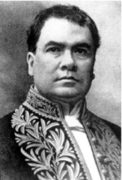Symphony in Gray Major

The sea like a coarse mirror of silver
reflects a metallic sky of zinc;
distant flocks of cormorants tarnish
its polished bottom of pallid gray.
The sun like a glass, round and opaque,
paces to its zenith with a halting gait;
the ocean breezes settle in the shadow
making a pillow of a black clarinet.
The waves that heave their leaden bellies
under the dock all seem to moan.
Seated on a cable, smoking his briar,
a sailor is thinking about the beaches
of a vague, remote and foggy place.
He is old, that sea dog. His face is weathered
from the fiery rays of the Brazilian sun;
the rough typhoons of the sea of China
have seen him drinking his flask of gin.
The foam full of iodine and saltpeter
over time has known his ruddy nose,
his curly hair, his muscular biceps,
his cap of canvas, his shirt of drill.
There in the smoke from his pipe tobacco
the old salt sees the remote, foggy place,
where on an evening, fiery and golden,
the sails billowed on a vanishing brig.
The nap of the tropics. The sea dog dozes.
Now all is cast in the gamut of gray.
It seems a soft, enormous obscuring
of horizon could blot the boundary line.
The nap of the tropics. The old cicada
rehearses his hoarse and senile guitar,
and the cricket sings a monotone solo
on the singular string of his violin.
SINFONIA EN GRIS MAYOR
El mar como un vasto cristal azogado
refleja la lámina de un cielo de zinc;
lejanas bandadas de pájaros manchan
el fondo bruñido de pálido gris.
El sol como un vidrio redondo y opaco
con paso de enfermo camina al cenit;
el viento marino descansa en la sombra
teniendo de almohada su egro clarín.
Las ondas que mueven su vientre de plomo
debajo del muelle parecen gemir.
Sentado en un cable, fumando su pipa,
está un marinero pensando en las playas
de un vago, lejano, brumoso país.
Es viejo ese lobo. Tostaron su cara
los rayos de fuego del sol del Brasil;
los recios tifones del mar de la China
le han visto bebiendo su frasco de gin.
La espuma impregnada de yodo y salitre
ha tiempo conoce su roja nariz,
sus crespos cabellos, sus bíceps de atleta,
su gorra de lona, su blusa de dril.
En medio del humo que forma el tabaco
ve el viejo el lejano, brumoso país,
adonde una tarde caliente y dorada
tendidas las velas partió el bergantín…
La siesta del trópico. El lobo se aduerme.
Ya todo lo envuelve la gama del gris.
Parece que un suave y enorme esfumino
del curvo horizonte borrara el confín.
La siesta del trópico. La vieja cigarra
ensaya su ronca guitarra senil,
y el grillo preludia un solo monótono
en la única cuerda que está en su violín.
1891
Translator’s note:
“Symphony in Gray Major” was suggested by Théophile Gautier’s poem “À Symphonie en blanc majeur.” Not only does the poem’s accumulation of images suggest a symphony of gray (a universal sadness and monotony), but its symbolist effect is augmented rhythmically, through the use of the unusual amphibrach foot which heightens the monotonous feeling that pervades the poem. In translating it, I have roughed my meter toward a four–beat line, and replicated the alternating rising and falling line endings. I’ve made free use of assonance, consonance, and even alliteration to recreate in English some similar or equivalent impact of Dario’s rhymes.

Mark Wacome Stevick directs the creative writing program and the Princemere Poetry Prize at Gordon College. His plays include Cry Innocent and Goodnight, Captain White, which run seasonally in Salem, Massachusetts, and The Sheep Mysteries, which is performed regularly in New York City and in Orvieto, Italy—where Mark often gets to lead a month-long workshop on ekphrasis. His poems have recently won awards from Swink, Wild Plum, The Baltimore Review, Literal Latte, and The Shine Journal. Last summer he was a story slam winner at The Moth in Boston.





